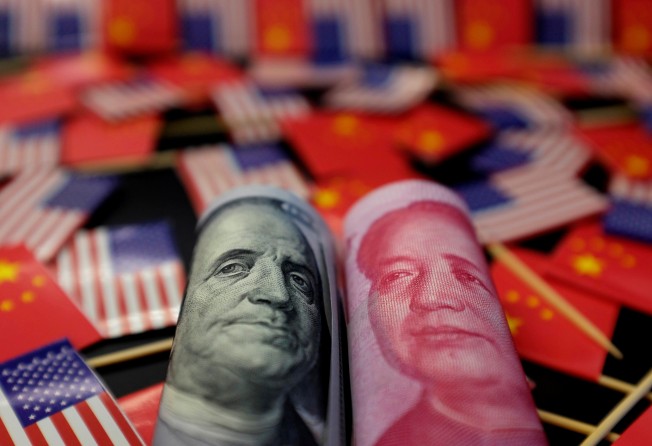Donald Trump’s WTO move is a feeble answer to the China challenge
- The US wants to rewrite the rules of the global trading game it helped create, and may well succeed. But the challenge of China’s economic model, a combination of authoritarian capitalism and ruthless enterprise, won’t be so easily dismissed

It would seem logical for the world’s largest debtor to name the world’s largest lender as one of the “world’s richest countries”.
Last week, the Trump administration demanded that the World Trade Organisation update its definition of a “developing country” and remove the favourable treatment the designation confers on nations like China. US President Donald Trump tweeted that “the WTO is broken when the world’s richest countries claim to be developing countries to avoid WTO rules and get special treatment”.
How rich is China? President Xi Jinping could be excused for bathing in the sense of wealth and power at the Forum on China-Africa Cooperation last September with all but 12 heads of state or government in attendance. At the summit, Africa received US$60 billion of grants and loans from Beijing, a gift for paying homage to China.
China has become the world’s largest creditor. With US$700 billion in loans accounted for, it is twice as large as the World Bank and International Monetary Fund combined. China has no match in 21st century global extravagance.
But in the liberal global order, rules matter. Chinese foreign ministry spokeswoman Hua Chunying was right to point out that the criteria and procedures for labelling an economy a “developing country” under the WTO should not be decided by one country.
Trump may try to rewrite the rules of the global trading game, but only on the playground that Harry Truman laid. After the Iron Curtain fell, it was on the grounds of national security – not trade – that the WTO’s predecessor, the General Agreement on Tariffs and Trade, was born. It was created to magnify liberal markets and defend liberal democracy.
President Truman might have wished that every member thereafter in the global trading regime, under Pax Americana, was an abiding supporter of his vision. Little of that is true today.
The largest global trading nation is neither a liberal market nor a liberal democracy. The largest economy in the world, Truman’s own, no longer supports global free trade. Something has gone wrong, either with the vision or the execution.
China, too, may soon start writing rules of its own. It won’t be liberal; it will be global
This is the 21st century. The world’s two largest global economic powers are competing on the basis of 20th century rules, with tools recollected from 16th century Machiavellianism.
It is also true that China is both a rich country and a developing country. It depends on what one looks at: the status of the state, or the people.
A single company in China has 500,000 couriers fighting for the opportunity to deliver food to homes on motorbikes, around the clock.
Dashing between restaurants and homes, they earn on average 75 US cents each trip. On earnings that the developed world would despise, this willing labour force built Meituan Dianping, China’s “Amazon for services”, into a US$50 billion company.
China’s “996” work culture – working from 9am to 9pm, six days a week – is a blessing for the workers, as Chinese tycoon Jack Ma noted, because many more people don’t have the opportunity for work.
All of this can only happen in a developing country.
China’s economic model is as bifurcated as its economic stature. China today is a country of two economies, spinning between the two extremes of capitalism – authoritarian at one end and libertarian at the other. Both economies defy America’s liberal market rules.
At a recent China banking conference, a senior Chinese banking executive said China has leapfrogged the US in fintech innovation. It is ahead by about two years, and the gap may continue to widen. The reason? There are too many rules and regulations in the US, he said. “In China, we don’t have this problem.”
America’s liberal market is unable to compete with state capitalism and its ability to mobilise state capacity. While China sets out to transform the Eurasian road map with billions of dollars of infrastructure investment under its Belt and Road Initiative, Trump can barely get the border wall with Mexico funded.
The US liberal market is also disadvantaged when competing with China’s 18th century laissez-faire capitalism. It is entrepreneurialism at its most ruthless and primal, governed by minimal rules and regulations. In this system, neither intellectual property protection nor individual privacy protection trumps the instincts for entrepreneurial success.
Trump may enjoy winning many small battles in the US-China trade war, including changing China’s developing country status under the WTO. As the legitimate heir of the rule-setter of the 20th century, he may well succeed. But China, too, may soon start writing rules of its own. It won’t be liberal; it will be global.
There are thus bigger challenges that Trump needs to tackle, as both he and Xi try to rewrite the 20th century rules for the 21st century.
Dr Shirley Ze Yu is senior visiting fellow at the London School of Economics, a fellow at Harvard Kennedy School and a former Chinese national television (CCTV) news anchor